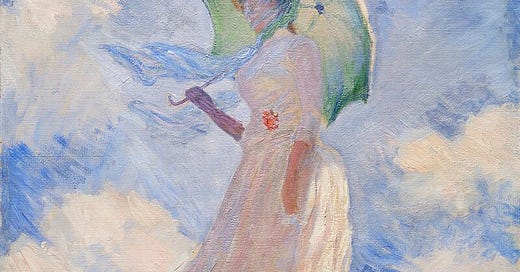Why Learning French Through Poetry is the Most Beautiful Way to Learn
and It’s Backed by Science.
Bonjour à tous,
This is something I believe with my whole heart, and something I’ve seen time and time again, not just in my own life, but in the lives of my students.
If you want to learn French not just well, but deeply in a way that sticks, moves you, and makes you want to come back to the language again and again, then learn it through poetry.
I know that might sound romantic, or even a little old-fashioned. But it’s not.
In fact, it’s one of the most scientifically effective, emotionally rich, and neurologically smart ways to learn.
Let me show you why.
Poetry Activates the Brain Like Music
Poetry is not just literature: it’s a neurological experience.
Studies using MRI scans have shown that when we read or listen to poetry, the brain’s reward and emotional centers are activated in much the same way as when we hear music.
In other words: poetry makes your brain light up.
This emotional reaction has real consequences. Emotion is tightly linked to memory. So when you connect emotionally with something, especially words, you’re more likely to retain it.
That’s why you might forget a list of vocabulary words you crammed last week…
but a single poetic line might stay with you for years.
Poetry Boosts Memory & Cognitive Health
Poetry doesn’t just “sound nice”, it gives your brain a serious workout.
When you read a poem, your brain is processing:
Sound patterns (rhythm, rhyme)
Vocabulary
Grammar
Imagery and metaphor
Emotional resonance
That’s a lot of mental processing happening at once, and research shows that it strengthens overall cognitive function, boosts memory, and enhances creativity.
Even more fascinating: studies show that poetry activates the default mode network, the same part of the brain that lights up during daydreaming, self-reflection, and deep introspection.
This makes poetry not just educational, but deeply therapeutic.
What Happens When You Add Language Learning?
Here’s where things get even more interesting.
Learning a new language, like French, physically changes your brain.
Research shows that bilinguals have:
Denser grey matter (more neurons + dendrites)
Stronger white matter connections (better communication between brain regions)
Improved memory, attention, and cognitive flexibility
Even adults who begin later in life show measurable increases in brain function and long-term protection against cognitive decline.
So when you combine the power of poetry with the power of language learning?
You get one of the most powerful, beautiful, and brain-friendly ways to learn.
Why I Teach French This Way
As a French teacher, I’ve tried a lot of methods. Grammar charts, vocabulary drills, textbook dialogues. They have their place.
But the most transformative moments I’ve witnessed in my students, those moments when the language clicked, when the meaning mattered, came through poetry and music.
Suddenly, the words weren’t just “rules.” They were living things. They had rhythm. Emotion. Beauty. Context.
I saw my students connect with the language, not just memorize it.
They started feeling it. Speaking it with more fluency, more confidence, more joy.
And that joy, that emotion, is what keeps you coming back.
It’s what makes you fall in love with the language.
So What Happens When You Learn French Through Poetry?
You retain more because of the emotional connection.
You speak better because of the rhythm and musicality.
You learn vocabulary in context, not in isolation.
You absorb grammar naturally, the way children do.
You immerse yourself in French culture, history, and soul.
You retrain your brain while nourishing your heart.
It’s not about studying harder. It’s about learning deeper.
It’s about slowing down, noticing, and letting the language move you.
What I Offer
That’s why I created French en Poésie and this newsletter.
To offer French that’s not dry or mechanical but rich, alive, poetic.
To give you something you’ll remember. Something that will make your language journey a little more soulful.
Every week, I share:
A beautiful French poem (with audio + translation)
A curated vocab list (for beginner & advanced)
Useful grammar points in context
Culture, context, music & art
Literary bites
If this sounds like something that would nourish your mind and spirit, I’d love to have you along.
🌸 Join Us at French en Poésie
Whether you are just beginning your journey with French or you are a lifelong lover of the language, French en Poésie welcomes you into a space where poetry, literature, music, and art come alive.
Here, learning is not a chore, it’s a gentle immersion, a moment of beauty, a connection to something timeless.
Let's dream, learn, and grow together, one beautiful word at a time. 🌿✨
Merci de me lire,
à très bientôt
Morgane Andersson
What to Do Next:
Share this with someone learning French :
Try reading a French poem (like La chanson des Escargots) aloud (yes, even if you don’t “get” it all yet!)
Subscribe to the newsletter if you haven’t yet and receive your free welcome gift: A Poetic Guide to French Pronunciation.
Let poetry teach you French. Let French teach you to feel more deeply.












Sure, but when I was learning French many years ago, I read 'Les Fleurs du mal' and I'm not sure how much it helped me, I rarely needed to ask about 'maggots emanating from pores' and 'a serpent's desire' 😂
I'm kidding, I get your point.
Also, the metaphors that are immanent in the way we view the world, are carefully so crafted in poetry and show us new relationships and associations that enrich daily experience.